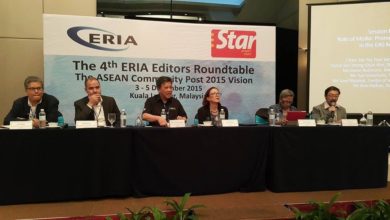UN experts: ASEAN Human Rights Declaration should maintain international standards
GENEVA – The largest body of independent experts in the United Nations Human Rights system today called on the Association of Southeast Asian Nations (ASEAN) to ensure that international human rights standards are maintained when they come to consider the adoption of the ASEAN Human Rights Declaration this Sunday, 18 November.
“It is imperative that, as a minimum, ASEAN’s landmark human rights instrument maintains international standards to complement the work of the UN human rights system,” said Michel Forst, who currently chairs the Coordination Committee set up by the independent experts designated by the UN Human Rights Council to address specific country situations and thematic issues in all parts of the world.
In an open letter* to ASEAN member States, the group of international experts stressed the need to reaffirm in their Declaration the duty of States to promote and protect all human rights and fundamental freedoms regardless of their particular political, economic and cultural systems – one of the key principles of the Vienna Declaration and Programme of Action, adopted by 171 States in 1993 to forge a new vision for global action for human rights into the next century.
“The raison d’être of regional human rights instruments is to establish minimum standards that all domestic laws need to comply with, which may involve the amendment of domestic laws if these violate human rights,” Mr. Forst said. “The right to life, for example, is a fundamental right upon which all other rights depend, and any credible human rights instrument should unconditionally protect it without making it contingent on the provisions of domestic law.”
“In relation to the right to life,” the Committee Chair warned, “provisions such as ‘in accordance with national law’ could be used to shield States against scrutiny by international human rights mechanisms concerning the excessive use of force by law enforcement officers, state failure to protect people against non-state actors and the continuation of the use of the death penalty.”
The Human Rights Council independent experts also drew attention to provisions in the draft ASEAN Declaration which seek to ‘balance’ rights with individual duties. “This is not the wording of international human rights law,” they pointed out. “Advocating a balance between human rights and duties creates much greater scope for Governments to place arbitrary, disproportionate and unnecessary restrictions on human rights.”
“With regard to legitimate restrictions, under certain conditions, on the grounds of ‘morality,’ ‘public order’ and ‘national security,’” Mr. Forst noted, “the Human Rights Council experts are acutely aware of the risk of these terms being used as a pretext by Governments to place arbitrary, disproportionate and unnecessary restrictions on human rights”.
“We strongly encourage the inclusion of language which makes explicit that the restrictions must be provided by law and conform to the strict tests of necessity and proportionality, and that these restrictions may not put in jeopardy the right itself or apply to rights that are non-derogable under international law,” he said.
The experts also called on ASEAN to consider in their declaration the issues of statelessness, the right to seek and to enjoy asylum from persecution in other countries, and the international customary law principle of non-refoulement (to prevent persons from being returned to countries where, for instance, they will be subjected to torture). “Again, such provisions should not be contingent on domestic laws,” underscored Mr. Forst.
“The ASEAN Human Rights Declaration should take its place as a landmark document which contributes to an improvement in the human rights situation in South-East Asia,” the Committee Chair said. “To achieve this, we call on all ASEAN member States to consult further with the people of the region, including civil society organisations, and to take on board their concerns and aspirations.”
“The independent experts of the Human Rights Council Special Procedures stand ready to provide further advice to ASEAN in this historic task,” he added. (Press Release of the United Nations Human Rights on 16 November 2012)

